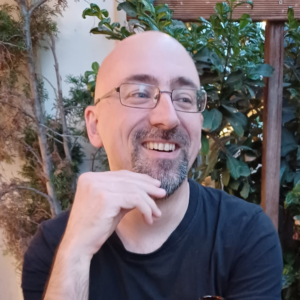Frank Goymann M.A.
Humboldt-Universität zu Berlin
Institut für deutsche Sprache und Linguistik
Frank Goymann studied Historical Linguistics at the Humboldt-Universität zu Berlin. His main interests are morphology and morphosyntax. As a part of project B02 he is currently researching the Old Latvian Postil of Georg Mancelius and is working on a PhD thesis that is concerned with the usage of participle constructions in the Postil.
Projects
B02
Emergence and change of registers: The case of Lithuanian and Latvian
Contact
Humboldt-Universität zu Berlin, Mohrenstraße 40/41, 10117 Berlin
+49 (0)30 2093 - 12705
https://orcid.org/0000-0002-2396-8271
Publications & Presentations
Goymann, Frank (2023) A Grammatically Annotated Corpus of the Old Latvian Postil of Georg Mancelius [DOI] [ViVo] This grammatically annoted corpus aims at facilitating linguistic research on Old Latvian based on the Postil of Georg Mancelius from the year 1654. The corpus is divided into two subcorpora, "pericopes" and "homilies" to make register related research easier.
The pericopes were annotated using SIL Toolbox and converted to be used in the search-tool ANNIS using the conversion tool PEPPER.
Three formats are provided in this release: 1. the Toolbox files, 2. the transitional Excel files and 3. a zipped folder to be imported into ANNIS.
Created in the project B02, Emergence and change of registers: The case of Lithuanian and Latvian of the CRC 1412 "Register" (funded by the Deutsche Forschungsgemeinschaft: DFG, German Research Foundation: 416591334).
Lehmann, Nico; Serova, Dina; Lukassek, Julia; Döring, Sophia; Goymann, Frank; Lüdeling, Anke; Akbari, Roodabeh (2023) Guidelines for the annotation of parameters of narration. In: REALIS: Register Aspects of Language in Situation [DOI] [PDF] [ViVo] The present guidelines describe the annotation of narrative phenomena on the clause level, using a combination of ideas and methods from linguistics and lit- erary studies. The main categories marking the discourse strategy “narration” in stretches of text have been narrowed down to mediacy, i. e. involving a narrator, and sequentiality of events. This document specifies how to define mediacy, and in turn determine whether a narrator is present, as well as how to identify events and their sequential ordering. Lastly, a functional layer annotation is proposed which allows researchers to compare different types of narrative instances. This offers a basis for investigating a potential narrative register which is said to be important for many kinds of register studies.Feulner, Anna Helene; Goymann, Frank; Hock, Wolfgang; Vanhala, Otso (2023) Register im älteren Baltischen: Die Postillen des Altlitauischen und Altlettischen In: Archivum Lithuanicum [ViVo] Goymann, Frank; Schütz, Johannes (2023) Perfekt und Nebensätze im Altlettischen In: Linguistica Lettica [ViVo] This article analyzes the emergence of functional variation of language in the early stages of the old Baltic languages as a part of the ongoing research of functional variation of the DFG-funded project CRC 1412 “Register”. It will be described how language usage varies according to the communicative goals and function of a text and shown that texts with two different functions can be found in the postils that were used in the Christianization process of the Baltic countries in the 16th and 17th century. Using the Lang=gewünschte Lettische Postil of Georg Mancelius, it will be shown that functionally motivated variation in the usage of the perfect and in the usage of forms of the preteritit active participle without an auxiliary in subordinate sentences can be found in the Old Latvian language.Goymann, Frank; Schütz, Johannes (2021) Partizipien und Nebensätze im Altlettischen In: XIII International Congress of Balticists [ViVo]